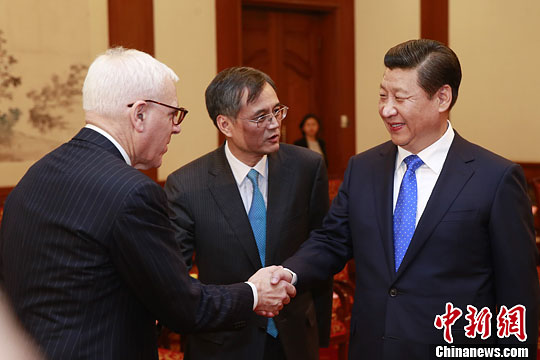Foreign consulting firms in China
- By Zhang Lulu
 0 Comment(s)
0 Comment(s) Print
Print E-mail China.org.cn, February 19, 2014
E-mail China.org.cn, February 19, 2014
|
|
|
Chinese President Xi Jinping meets with foreign members of the Advisory Board of the Tsinghua School of Economics and Management on October 23, 2013 in Beijing. [File photo] |
The history of foreign experts' involvement in China's reform can be dated back to the 1980s when economists like Joseph Stiglitz and Milton Friedman participated in discussions on China's reforms, as special advisors to the Chinese government. China has undergone massive changes in terms of using foreign talent since then.
Yu Jin, a partner with McKinsey & Company and the head of its Beijing office, said that some companies and government bodies have got over their doubts about whether Western ideas can solve China's problems, and an increasing number of Chinese companies have sought advice from foreign consulting firms like McKinsey.
McKinsey has also maintained strong cooperation with Chinese clients, and the company has nurtured a group of homegrown Chinese partners to better adjust to the Chinese market, Yu added, citing herself as an example.
Accenture's practice has been similar. Li Gang, president of Accenture's Greater China business, said that a noteworthy change in the company in the recent decade is that while it served multinational companies more when it first entered China, now over 80 percent of its clients are Chinese companies.
The key to success
Foreign consulting firms have been successful in China because they are professional, confidential, and well-connected.
McKinsey undertook a project to research Sichuan Province's industrialization for the 12th Five Year Plan in 2010. The company analyzed the internal and external environment of Sichuan's industry, looking both inside and outside China. The project was praised by the government.
Huang He, partner and Managing Director at the Boston Consulting Group (BCG), explained that the international vision and objectivity demonstrated in the work of foreign consulting firms appeals to Chinese local governments and companies.
A high degree of confidentiality is also key to the success of the consultancies in China. A top company in a certain industry once asked a strategic consulting firm to produce a five-year plan for them, but as the firm was not bound by a confidentiality agreement, and so plan was later used by many other companies in that industry and led to overproduction. High-end consulting firms can usually be trusted to preserve confidentiality, McKinsey's Yu Jin explained.
Besides respecting professionalism and confidentiality, Chinese local governments have also set their sights on the resources and connections owned by first-class consulting firms.
The Shanghai government has worked with McKinsey for more than ten years. Their first project was the renovation of the Shanghai Nanjing Road, a decade or so ago. Besides making a plan to turn the road into a first-rate shopping street, McKinsey also helped attract global clients to the area. Since then, several Shanghai district governments have been working with McKinsey to explore opportunities.
Cooperation with Chinese government and enterprises
Besides the Sichuan and Shanghai governments, international consulting firms have also cooperated with lower level governments and enterprises.
Accenture worked with the Chinese Academy of Sciences and published a report on Chinese cities in 2013, for the central and local decision-makers' reference. The report found that China's megacities are too large to support limitless expansion while medium-sized cities (with a population of one to three million and a GDP per capita of 50,000 to 70,000 yuan) should be priorities in urbanization.
Another example is the Boston Consulting Group, which provided strategic consultancy to the Bank of China (BOC) before the bank went public. As the first Chinese bank to go global, with 10 percent of its business carried out abroad in 2003 and 2004, the bank wanted to expand its overseas business further, but BCG's advice was to focus on the Chinese domestic market and retail business, as they believed the next ten years would be a golden period for the Chinese economy which the bank could not afford to lose out on. After the bank went public in 2006, its business strategy was to keep to the domestic market.
More time needed
Chinese companies' demand for consulting firms has changed from focusing on resolving short-term business problems to working on long-term plans, including the management of the enterprises, talent strategies and organizational structure, according to Accenture's Li Gang.
The costs foreign consulting firms charge are usually eye-watering, but their plans are not always put into practice. An insider revealed that sometimes local governments simply disregard project plans. A government body responsible for a local development zone once hired a foreign consulting firm to do a development plan, but the completed plan was left untouched.
Li said that the demand for and value from consultancy reports are rapidly shrinking, while the demand for result-oriented professional services is increasing. Strategic consulting aims only to discover problems; however practical needs tend to require solutions that can be implemented.
The head of a Hunan-based company which once took the advice from a foreign consulting firm revealed that the two sides cooperated well in the primary stage, but when it came to the practical implementation and the assessment of the project, things were far from ideal. "It has to do with [the consulting firm's] ability to adapt to the Chinese environment, and the coordination of the team. More time will be needed for Chinese enterprises and foreign consulting firms to adjust to each other."
Follow China.org.cn on Twitter and on Facebook to join the conversation.






